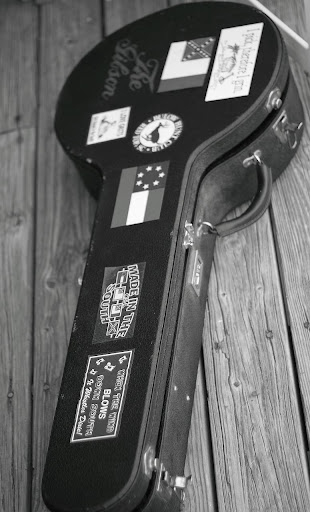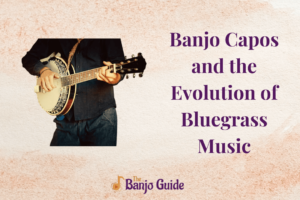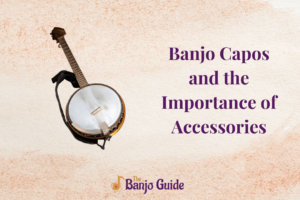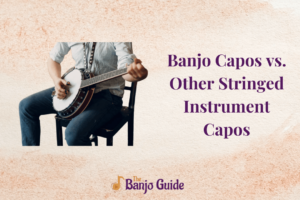Banjo cases are important for protecting a banjo from havoc. Investing in a banjo case ensures safe storage and transportation of your banjo. They also offer a safe and secure place to store banjo accessories such as picks, extra strings, and straps.
In this best guide to banjo cases, we will learn about the importance of a banjo, types of cases, factors to consider when choosing a banjo case, tips for protecting your banjo while traveling, and the evolution of banjo case design in brief. So, let’s get started! There is a lot to learn.
Understanding The Importance Of A Banjo Case: Protecting Your Instrument From Harm
- A banjo case protects the musical instrument from extreme temperatures, humidity, and more. Such elements can cause damage to the delicate parts of your instrument.
- A banjo case keeps the banjo in good condition.
- Keeping a banjo dust-free and clean is made easy with banjo cases.
- A banjo case is an essential accessory for all the banjo players. It offers protection to the banjo when it is not in use.
- Transporting a banjo is made easy with a banjo case.
- A banjo case protects the finishing of the instrument from harm.
Types Of Banjo Cases: From Hardshell To Softshell Options And Everything In Between
- Hardshell Banjo Case:
- A Hardshell banjo case is a protective banjo case.
- It is highly durable.
- It has an injection-mold Hardshell design.
- It is made from high-quality materials.
- It boasts some unique features.
- It comes with interior pockets to store banjo tools and accessories.
- Lightweight Banjo Case:
- A lightweight banjo case is another excellent option.
- Most lightweight banjo cases are highly durable.
- They come with a detachable shoulder strap.
- A lightweight banjo case is the perfect solution for protecting and transporting your banjo.
- Banjo Gig Bag:
- A banjo gig bad offers attractive and practical features.
- It is one of the most cost-effective options for protecting your banjo.
- It comes with a strap for easily carrying it.
- A gig bag is perfect for traveling and daily use.
- It can hold a lot of equipment or accessories.
- It makes transporting and storing your banjo easy.
- Hardshell Open Back Banjo Case:
- If you are looking for a sophisticated banjo case, a Hardshell open-back one makes a great option.
- The core offers unbeatable protection.
- It comes with an ultra-strong arched design.
- It comes in the right shape for heavy-duty protection.
- Banjo Hard Case:
- A hard banjo case is a good option.
- It makes your instrument portable and offers good protection.
- It makes transportation of your banjo simple.
- It is highly durable and long-lasting.
- The cushioned handle of this case provides a comfortable grip.
- Softshell Banjo Case:
- A softshell banjo case offers good protection at economical prices.
- It comes with a pocket for accessories and a molded handle.
- It is the best choice for banjo players searching for budget-friendly and secure protection.
Factors To Consider When Choosing A Banjo Case: From Durability To Portability To Storage Space
- Material:
- Buy a banjo case made from high-quality materials.
- Most banjo cases are made using ABS plastic.
- If you travel often, you should buy a durable exterior case that can withstand damage from water, wear, and tear.
- Some banjo cases are also made using padded wood.
- Padding:
- Protecting your banjo from scratches and bumps is essential.
- Having a banjo case with adequate interior padding helps keep your banjo safe.
- Good quality padding is made using plush lining and foam.
- Size And Fit:
- A banjo case should fit tight and not snuggly.
- A well-fitted banjo case will ensure an instrument stays in place. For instance, a four-string banjo might not fit nicely inside a case for a five-string banjo.
- The case you buy will highly depend on the type of banjo.
- Weight:
- It would be best if you also considered the weight of your case.
- If you travel frequently, then buying a lightweight banjo case is the ultimate solution. Although it offers less protection than hard cases, it works well.
- Carrying heavy weight might become hard for more extended periods.
- Storage Compartments:
- Buying a banjo case with storage compartments is a must-have.
- Additional compartments are needed to store accessories like picks, capos, and tuners.
- Select a case with enough storage space for your needs.
Protecting Your Banjo While Traveling: Tips For Keeping Your Instrument Safe On The Road
- Invest In A Great Banjo Case:
- A softshell case will be the best choice if you are looking for a lightweight one. You can wear it on the back and carry it anywhere. It is easy and quick to pack up.
- On the other hand, a hardshell case is the best protection in case you don’t know what’s coming on the road. They are dependable. They are best suited for the beating. You should buy a custom-fit case. These cases also come with a long-term warranty.
- There are tons of banjo cases available out there. Pick one that is highly recommended for your instrument.
- Prepare The Banjo Case Internally:
- Limited storage spaces can wreck an instrument. It can have a significant effect on the strings and loosen them. It can cause stress on the wood and cracks. It can even snap a headstock. Therefore, it is essential to secure everything in place inside the case.
- Buying a well-made banjo case with snuggly compartments can prevent your banjo from getting hurt. It reduces the chance of things jiggling out of place.
- Lastly, you must invest in a humidifier. Humidity can damage the wood. An excellent humidifier will regulate the humidity in your case internally.
- Be Aware Of Your Surroundings:
- When loading and unloading your instrument, be aware of your surroundings. Please don’t leave it unattended. Always keep an eye on it.
- Avoid keeping your instrument, even while it is in a case, in a dingy or dirty place.
- Don’t leave your instrument in the car. Conceal it to save it from the public eye. Thieves might eye the instrument. Keep your car parked in a safe area when away. Thieves might see your vehicle is out of state and plan to loot things inside.
- Get Instrument Or Travel Insurance:
- If you often travel with your instrument, then you should get instrument or travel insurance.
- Everyone is not born with a silver spoon. Buying a whole new instrument if something happens is an entirely different story. Spending cash on expensive repairs is another. So, taking care of your instrument will save you a lot.
- Many insurance companies specialize in music equipment insurance. You can have as much insurance coverage as you feel will be right for you. The companies offer unique insurance policies to suit a musician’s needs.
The Evolution Of Banjo Case Design: From Early Wooden Cases To Modern-Day Innovations
- The banjo case design has evolved over the years. Earlier, people used to make custom wooden cases to protect their banjo.
- The wooden cases would have a thick and rigid body. They used to be a secure and durable option for preventing damage and crushing and offered comprehensive waterproof protection.
- Banjo cases are available in several sizes, fabrics, and unique features today.
- Nowadays, a good banjo case suits the needs of the banjo instrument owner.
- While some banjo players look for modern-day innovations like huge storage space and compartments, other banjo players look for lightweight option gig bags to travel quickly and often.
Conclusion
When protecting your banjo, understanding the role of a banjo case is essential. From Hardshell banjo cases to softshell cases for your banjo, the types of banjo cases and their features differ in the benefits offered.
The best way to find out what Banjo case will suit you is to consider several factors like material, padding, size, fit, weight, and storage compartments.
Once you understand what banjo case you will need, the next step is learning how to protect your banjo while traveling on the road. From investing in an excellent banjo case to getting instrument insurance, there are many tips for maintaining your banjo case.
Overall, it is worth it to spend money on protecting your instrument. This best guide to banjo cases will help you pick the best chance for your banjo.
FAQs
- Do you need a case for your banjo?
A banjo case is undoubtedly a must-have accessory for your banjo. It offers good protection to your banjo. Transporting your banjo on the road is accessible in the best case.
- Will a banjo fit in a guitar case?
No doubt a banjo and a guitar are similar in shape, but a banjo will not fit in a guitar case. This is because the shape and design of the banjo are entirely different. It is better to invest in a separate case for your banjo.
- Can I fly with a banjo?
It would help to use a hard case to protect your banjo while flying. You can pack the banjo inside the case and hope for the best. You can also use a gig bag for lighter or travel banjos. You can carry it on if it feels right.




